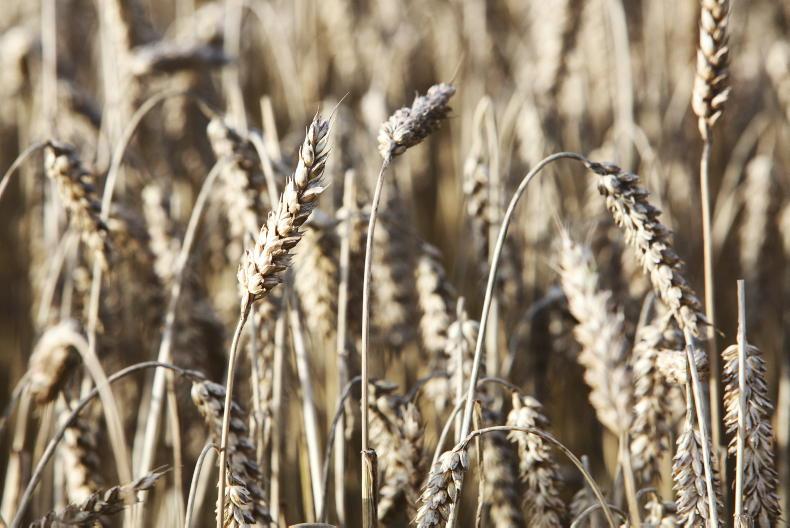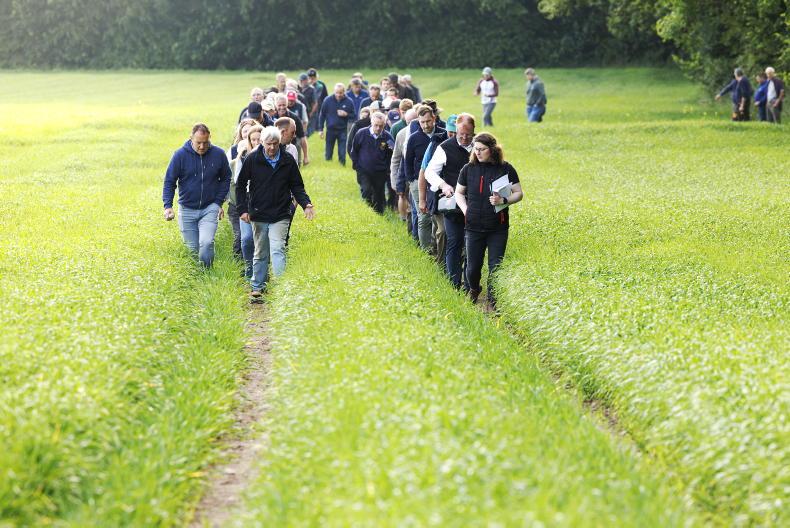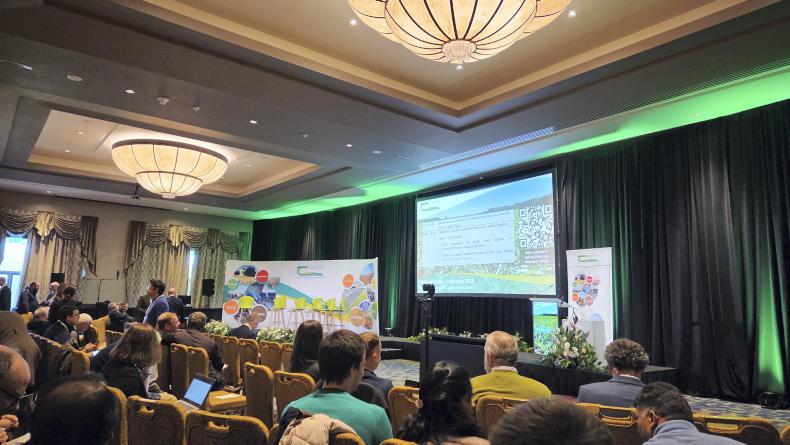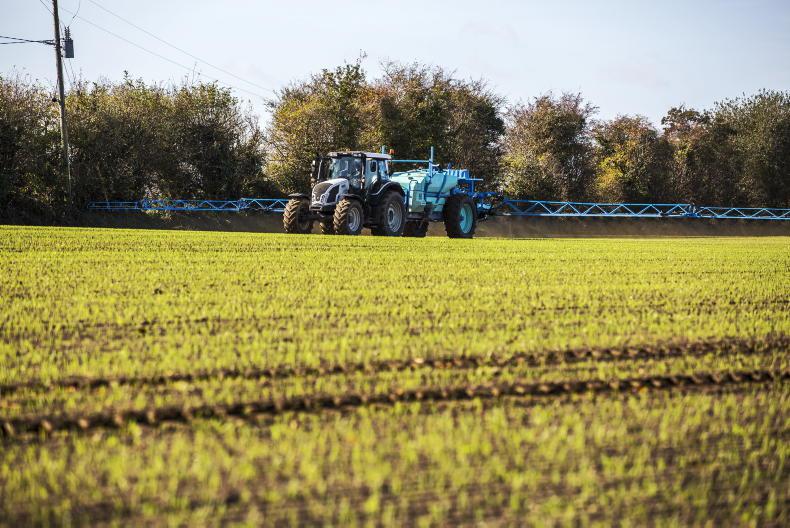Eamonn Cogan,
Slane,
Co Meath
It’s very busy on the Cogan farm at present, with winter cereal planting now in full swing. Some winter wheat was planted last week on heavy ground. Eamonn noted that they were trying to hold off on winter barley and wanted to get into some land before more rain fell.
The main winter wheat varieties on the farm are Graham (50%-60% of the area), Dawsum and Champion. Eamonn is delighted to try new varieties and this year he managed to get a small bit of Champion seed, while also trying out Dawsum for the first time.
The oilseed rape is looking really well, according to Eamonn. It was sprayed with a pre-emergence herbicide and is due a spray to control cereal volunteers. All the oilseed rape received slug pellets, as slugs were a problem, while some of the crop received two applications of pellets on headlands and where straw was chopped.
Slugs are also visible in the newly sown winter wheat planted after oilseed rape and this will be watched carefully. The crows are also landing and doing some damage, despite a seeding depth of three inches, so bangers were being set up earlier this week. Eamonn noted that it is loose ground.
More heavy ground will be drilled this week. Winter barley planting will begin and Belfry and KWS Tardis are the varieties of choice. The KWS Tardis did very well last year at 4t/ac. Eamonn commented that it was nearly treated like the hybrids, as it likes to be fed and driven on. If he gets his hands on some SY Armadillo seed, that will also be planted.
Some mushroom compost has been applied to ground and the plough was working slightly ahead of the drill earlier in the week, but Eamonn noted that this will tighten up as the risk of rain gets nearer. Winter oats will also be planted when weather allows later in October.
Eamonn will try to apply a pre-emergence herbicide to winter cereals to get good control of grass weeds in his winter crops, but he will go out at the two-leaf stage with an aphicide as well.
George Byrne,
Bennekerry,
Co Carlow

George Byrne's maize being harvested.
It’s all go on the Byrne farm in Co Carlow this week, from harvesting maize and beet to planting winter cereals. Maize was harvested earlier this week and George said that “maize yielded 24.5t/ac across our weighbridge”. That was at a dry matter content of approximately 30%. There was still some green in the stem, but conditions were ideal for harvesting and cob quality was good.
That field will be cultivated with a McConnel Discaerator – a sub soiler and disc combination – and George hopes to min-till in a winter cereal crop. The Discaerator worked well last year after maize and potatoes.
When we spoke on Monday, he had just finished spraying off winter barley stubbles which had straw incorporated. Hybrid rye will be planted into this ground, again using minimum tillage. This is the first time George will plant rye on the farm.
He commented that if he has an opportunity to avoid ploughing, he will take it, as it will cut down on work as well as having advantages for the soil.
He is waiting on winter barley seed to arrive. SY Armadillo will be the main variety on the farm this season, but he will delay planting until early next week weather permitting. Oats and wheat will follow later in October.
The spring beans were harvested on the farm last week. They came in at 20% moisture content and yielded 2.7t/ac. They were one of the last crops to be harvested in the area and George was pleasantly surprised with the yield. The bean stalks were chopped.
The sugar beet harvest starts this week.
It won’t be needed for feeding for a week or 10 days, but George will get some into the yard beforehand. Some bulls have been inside for six or seven weeks, while more will come in in the coming weeks. Grass growth is now good, but George also has some forage rape to graze, so this will help with feed reserves for the winter.
Kenny Dunne,
Eglinton,
Co Derry

Spring wheat.
Kenny Dunne finished his harvest last weekend. Spring wheat was the last crop to be cut and while it was only just about ripe, it was harvested before the rain came or it would have been very difficult to cut later on and may have been affected by sprouting if it wasn’t cut.
The moisture content was 24% and it was being dried slowly this week. Kenny estimates that it yielded about 3t/ac, but he does not have the final weights.
Straw
Straw is now sold out and Kenny chopped a good percentage of straw this year to put some fertiliser back into the ground and to cut out some of the work that baling and loading straw brings.
He tries to avoid storing the straw as it brings extra costs.
Overall, Kenny said that it has been a fair year with good prices.
Sowing
Usually sowing on the farm begins around the middle of October, but this year, sowing might start this week. The machinery is ready to go, but with heavy rain due on Friday, this might change.
There is a mixture of light and heavy land on the farm, which allows for some leeway when heavy rain comes. The plough and the drill will be working together in the fields.
Seeding
Kenny is very busy with his seed business at present and is almost sold out of winter wheat, barley and oats seed.
Tardis and Bolton are the main barley varieties, but Kenny commented that many farmers still like to grow some of the older varieties, such as Infinity and Cassia.
There are a lot of farmers busy sowing in the area this week ahead of the heavy rain, which is forecast at the weekend.
When asked about accessing more land, Kenny noted that it’s very difficult as there are a number of anaerobic digesters in the area, which need land for crops to feed the digesters.
Eamonn Cogan,
Slane,
Co Meath
It’s very busy on the Cogan farm at present, with winter cereal planting now in full swing. Some winter wheat was planted last week on heavy ground. Eamonn noted that they were trying to hold off on winter barley and wanted to get into some land before more rain fell.
The main winter wheat varieties on the farm are Graham (50%-60% of the area), Dawsum and Champion. Eamonn is delighted to try new varieties and this year he managed to get a small bit of Champion seed, while also trying out Dawsum for the first time.
The oilseed rape is looking really well, according to Eamonn. It was sprayed with a pre-emergence herbicide and is due a spray to control cereal volunteers. All the oilseed rape received slug pellets, as slugs were a problem, while some of the crop received two applications of pellets on headlands and where straw was chopped.
Slugs are also visible in the newly sown winter wheat planted after oilseed rape and this will be watched carefully. The crows are also landing and doing some damage, despite a seeding depth of three inches, so bangers were being set up earlier this week. Eamonn noted that it is loose ground.
More heavy ground will be drilled this week. Winter barley planting will begin and Belfry and KWS Tardis are the varieties of choice. The KWS Tardis did very well last year at 4t/ac. Eamonn commented that it was nearly treated like the hybrids, as it likes to be fed and driven on. If he gets his hands on some SY Armadillo seed, that will also be planted.
Some mushroom compost has been applied to ground and the plough was working slightly ahead of the drill earlier in the week, but Eamonn noted that this will tighten up as the risk of rain gets nearer. Winter oats will also be planted when weather allows later in October.
Eamonn will try to apply a pre-emergence herbicide to winter cereals to get good control of grass weeds in his winter crops, but he will go out at the two-leaf stage with an aphicide as well.
George Byrne,
Bennekerry,
Co Carlow

George Byrne's maize being harvested.
It’s all go on the Byrne farm in Co Carlow this week, from harvesting maize and beet to planting winter cereals. Maize was harvested earlier this week and George said that “maize yielded 24.5t/ac across our weighbridge”. That was at a dry matter content of approximately 30%. There was still some green in the stem, but conditions were ideal for harvesting and cob quality was good.
That field will be cultivated with a McConnel Discaerator – a sub soiler and disc combination – and George hopes to min-till in a winter cereal crop. The Discaerator worked well last year after maize and potatoes.
When we spoke on Monday, he had just finished spraying off winter barley stubbles which had straw incorporated. Hybrid rye will be planted into this ground, again using minimum tillage. This is the first time George will plant rye on the farm.
He commented that if he has an opportunity to avoid ploughing, he will take it, as it will cut down on work as well as having advantages for the soil.
He is waiting on winter barley seed to arrive. SY Armadillo will be the main variety on the farm this season, but he will delay planting until early next week weather permitting. Oats and wheat will follow later in October.
The spring beans were harvested on the farm last week. They came in at 20% moisture content and yielded 2.7t/ac. They were one of the last crops to be harvested in the area and George was pleasantly surprised with the yield. The bean stalks were chopped.
The sugar beet harvest starts this week.
It won’t be needed for feeding for a week or 10 days, but George will get some into the yard beforehand. Some bulls have been inside for six or seven weeks, while more will come in in the coming weeks. Grass growth is now good, but George also has some forage rape to graze, so this will help with feed reserves for the winter.
Kenny Dunne,
Eglinton,
Co Derry

Spring wheat.
Kenny Dunne finished his harvest last weekend. Spring wheat was the last crop to be cut and while it was only just about ripe, it was harvested before the rain came or it would have been very difficult to cut later on and may have been affected by sprouting if it wasn’t cut.
The moisture content was 24% and it was being dried slowly this week. Kenny estimates that it yielded about 3t/ac, but he does not have the final weights.
Straw
Straw is now sold out and Kenny chopped a good percentage of straw this year to put some fertiliser back into the ground and to cut out some of the work that baling and loading straw brings.
He tries to avoid storing the straw as it brings extra costs.
Overall, Kenny said that it has been a fair year with good prices.
Sowing
Usually sowing on the farm begins around the middle of October, but this year, sowing might start this week. The machinery is ready to go, but with heavy rain due on Friday, this might change.
There is a mixture of light and heavy land on the farm, which allows for some leeway when heavy rain comes. The plough and the drill will be working together in the fields.
Seeding
Kenny is very busy with his seed business at present and is almost sold out of winter wheat, barley and oats seed.
Tardis and Bolton are the main barley varieties, but Kenny commented that many farmers still like to grow some of the older varieties, such as Infinity and Cassia.
There are a lot of farmers busy sowing in the area this week ahead of the heavy rain, which is forecast at the weekend.
When asked about accessing more land, Kenny noted that it’s very difficult as there are a number of anaerobic digesters in the area, which need land for crops to feed the digesters.











SHARING OPTIONS